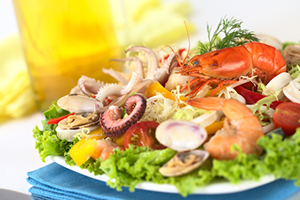 The reason blood pressure medications are so popular is frankly that they work to force blood pressure close to or down to a healthy level.
The reason blood pressure medications are so popular is frankly that they work to force blood pressure close to or down to a healthy level.
The bad news: They come with a litany of side effects, most often so serious that they outweigh the benefit of the drugs.
The good news: new research has revealed a vegetable that works exactly like the most effective blood pressure medications, without the side effects.
Recently, British and Irish researchers analyzed around 100 previously conducted studies on the heart benefits of seaweed. They published their study in the Journal of Agricultural and Food Chemistry.
Their survey unearthed the fact that many sea vegetables are low in calories and fat (good for weight loss), high in minerals like calcium, iron, copper, and iodine, extremely high in protein (up to 47 percent of their weight), and that they contain plenty of proteins called bioactive peptides that hold extraordinary heart health benefits.
They found that these bioactive peptides had effects similar to ACE inhibitor drugs, which are commonly prescribed to lower blood pressure.
ACE inhibitors inhibit your body’s production of angiotensin II, a chemical that constricts blood vessels and thereby elevates blood pressure. If you have less angiotensin II, your blood vessels can relax, dilate, and allow blood to flow through them at lower pressure.
The only problem? They can also cause headaches, dizziness, inflammation, fatigue, nausea, renal failure, and a built up of potassium that can cause cardiac dysfunction.
Sea vegetables are the first natural substances discovered that can have the same health effects without these harmful side effects.
At this stage most people get their bioactive peptides from milk, where they appear in much smaller amounts than in seaweed. Manufacturers of packaged soups and sauces also often include them in their products, but these products contain so many other harmful ingredients that it probably ruins the potential benefit.
Your local Asian supermarket should be a treasure trove of healthy sea vegetables. Here is a sample of what you can expect:
o Nori is the dried, often toasted sheets in which your sushi is wrapped. You can cut the sheets in strips to eat as noodles or add to stir-fry.
o Agar is available in bars, flakes, and powder. It is handy as a sauce thickener or a vegan substitute for gelatin in pie fillings and jams.
o Kelp is the common brown seaweed found on most beaches. It is normally sold in powder form to use as salt substitute or seasoning.
o Hijiki looks like spaghetti and is sold in dehydrated form. Soak it for 20 minutes, and then toss in stews and stir-fries. Limit your consumption to once a week, as it does contain some arsenic.
o Dulse can be bought as a dry powder, but the dried leaves need only five minutes of cooking and are great in salads and stews. When lightly pan-fried, it becomes crispy like potato chips.
o Arame turns black when it is dried, the form in which it is usually sold. Soak for 10 minutes before adding it to cooking dishes.
o Kombu, sold as dried strips, is a good seasoning agent in almost any dish. Soak for 15 minutes before cooking for about 40 minutes more.
Most of these double in size when they cook, so they are good value for money.

 Multiple Sclerosis
Multiple Sclerosis Banishing Bronchitis
Banishing Bronchitis Gum Disease Gone
Gum Disease Gone Overcoming Onychomycosis
Overcoming Onychomycosis Neuropathy No More
Neuropathy No More The Prostate Protocol
The Prostate Protocol Brain Booster
Brain Booster
 Ironbound
Ironbound
 Solution for Shingles
Solution for Shingles
 The Bone Density Solution
The Bone Density Solution
 The Ultimate Healing Protocol
The Ultimate Healing Protocol
 The Parkinson's Protocol
The Parkinson's Protocol
 The Chronic Kidney Disease Solution
The Chronic Kidney Disease Solution
 Overthrowing Anxiety
Overthrowing Anxiety The Fatty Liver Solution
The Fatty Liver Solution The Hypothyroidism Solution
The Hypothyroidism Solution
 The End of Gout
The End of Gout The Blood Pressure Program
The Blood Pressure Program
 The Oxigized Cholesterol Strategy
The Oxigized Cholesterol Strategy
 Stop Snoring And Sleep Apnea Program
Stop Snoring And Sleep Apnea Program
 The Arthritis Strategy
The Arthritis Strategy The Vertigo & Dizziness Program
The Vertigo & Dizziness Program The 3-Step Diabetes Strategy
The 3-Step Diabetes Strategy Hemorrhoids Healing Protocol
Hemorrhoids Healing Protocol The Erectile Dysfunction Master
The Erectile Dysfunction Master Weight Loss Breeze
Weight Loss Breeze The IBS Program
The IBS Program The Insomnia Program
The Insomnia Program The Migraine and Headache Program
The Migraine and Headache Program The Neck Pain Solution
The Neck Pain Solution The Menopause Solution
The Menopause Solution The Ejaculation Master
The Ejaculation Master The TMJ Solution
The TMJ Solution The Acid Reflux Solution
The Acid Reflux Solution The Fibromyalgia Solution
The Fibromyalgia Solution The Psoriasis Strategy
The Psoriasis Strategy